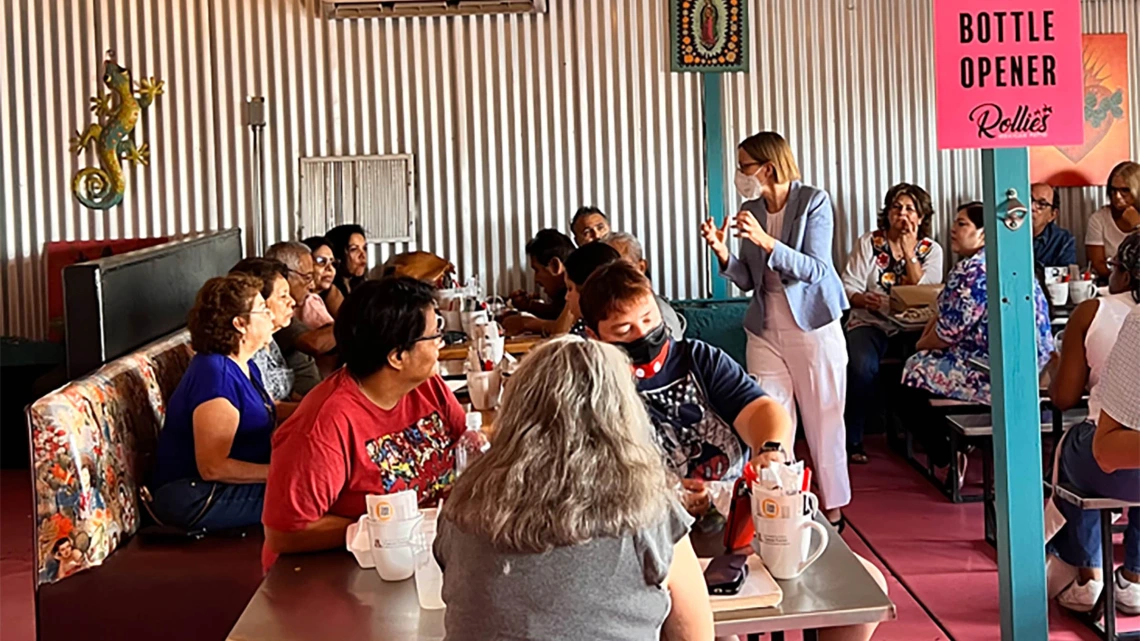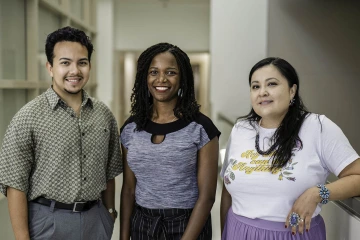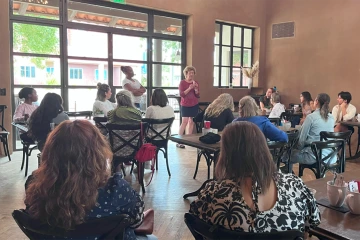Cancer Center program connects scientists to the community
Outreach program brings scientists to local cafes to meet with people interested in research, breaking down barriers to cancer research information.

Cancer Center Director Joann Sweasy, PhD, (right) speaks to the public at Rollies Mexican Patio in Tucson at the first of the center’s scientific cafes.
The boisterous, vibrant Rollies Mexican Patio in Tucson may seem like an odd place for a scientific talk, but for the University of Arizona Cancer Center’s outreach team it was the perfect venue to introduce their inaugural scientific café, a place where center researchers and the community can discuss cancer research in a relaxed setting.
The center’s Community Outreach and Engagement office developed the scientific cafés in collaboration with the center’s Research Outreach for Southern Arizona. The team created ROSA to facilitate equitable, collaborative, sustainable and relevant relationships between scientists and the communities they serve.

(From left) Juan Contreras II, research program administrator, Namoonga M. Mantina, community outreach and engagement manager, and Monica Yellowhair, PhD, assistant director collaborate on the Cancer Center’s scientific cafes in Tucson.
“Accessibility, inclusivity and overall relevancy to the community - that’s where culture plays a huge role in ROSA’s focus,” said Namoonga M. Mantina, COE community outreach manager. “The Cancer Center is the only comprehensive cancer center headquartered in Arizona. The work that happens here needs to be relevant specifically to the communities of Arizona and our catchment area of Southern Arizona.”
COE started their ROSA scientific cafés about a year ago, drawing about 25 community members to the first event. Moving the events to different locations throughout Southern Arizona allows the ROSA team to reach a different audience with each café. It also gives participants an opportunity to connect with Cancer Center scientists to hear about their work, ask questions and provide feedback on how to make research studies and material relevant to community needs.
COE researchers recently published an in-depth blueprint of the processes, experiences and lessons learned during the ROSA program’s development in Cancer Causes and Control.
In addition to Mantina, who is working toward her doctorate in public health at UArizona Mel and Enid Zuckerman College of Public Health, researchers included Juan Contreras II, research program administrator and master’s degree student in the College of Public Health; Monica Yellowhair, PhD, assistant director; Cynthia Miranti, PhD, professor in the Department of Cellular and Molecular Medicine and BIO5 Institute, chair of the Cancer Biology GIDP, and co-program leader of the Cancer Biology Research Program; and Jennifer Hatcher, PhD, MPH, associate director of UArizona’s Office of Inclusivity, Diversity, Equity and Accessibility.
“ROSA helps connect people to the research that is currently taking place here, but also does the flip side of that – it connects the researchers to the community. It benefits both sides,” Mantina said.
Collaborative mission of the Cancer Center
In 2020, the Cancer Center received a National Cancer Institute grant to establish collaborations between community members and basic scientists. Cancer is the second leading cause of death in the U.S., with more than 1.9 million new cancer cases and more than 600,000 estimated cancer-related deaths in 2022.
The center’s catchment area includes the five southernmost counties of Arizona, including the four counties that border Mexico, and contains 26% of the state’s population. It is 40% Hispanic.
“For us as a service to the community, we have to start with trust,” Mantina said. “There's a trust in us being able to report our work back (to the community) and to be respectful of the information that is shared with us (by community members), ensuring that it not only fulfills the mission of the Cancer Center, but that they feel represented and their voice was captured.”
The team developed a working group, a community and student ambassador program, scientific cafés and a community-based survey to improve and refine the program.
ROSA working group
The ROSA working group consisted of 17 members from throughout Southern Arizona: three members of the

Community members gather at Rollies Mexican Patio in Tucson for one of the Cancer Center’s scientific cafes.
The group assisted with developing the ROSA program’s community survey that was distributed throughout the Cancer Center catchment area. For scientific cafés, they provided valuable insight into their information delivery and feedback to the scientist on how the presentation of basic science information might be received best by Hispanic community members.
ROSA Ambassador Program
The COE team also created the ROSA Ambassador Program to engage Hispanic community members and bilingual and bicultural undergraduate students in the research process and to help facilitate community outreach and engagement with the center.
They found ambassadors from the local community to represent the Cancer Center in communities that could translate the center’s scientific work in a way that made community members more comfortable and interested in learning more. Additionally, they helped basic scientists translate scientific advances and terminology into lay language.
ROSA scientific cafés
Realizing the need to build interest and gain traction for these events, the COE designed the first scientific events to be informational; scientists were available to speak about their research, answer questions and learn from community members about their cancer priorities.
“For us as a service to the community, we have to start with trust.”
Namoonga M. Mantina
The first ROSA café featured Cancer Center Director Joann Sweasy, PhD, with special guest Adalberto Renteria, MD, medical director for Pascua Yaqui tribe translating into Spanish.
In the future, the team hopes the scientific cafés will also be a forum for scientists to discuss potential study proposals and obtain feedback on research to be conducted in the community. Mantina says this is an invaluable practice known as cultural humility.
“Sometimes in their project planning, the community is an afterthought,” Yellowhair said about the scientists. “We always get the requests to do research projects in tribal communities, but when the scientists design the research project, they forget to go actually ask for tribal permission or to work with someone from that community to see if this project is even beneficial to the community.”
“Cultural humility centers on the community, and it allows them to be experts in their experience,” Yellowhair said. “When you approach this work with the lens of cultural humility, it allows the community to be a voice for themselves; it allows their experiences to be given primary consideration, and it truly allows them to be the experts in how they believe they should be approached to improve their health outcomes.”

